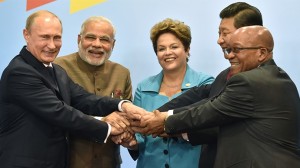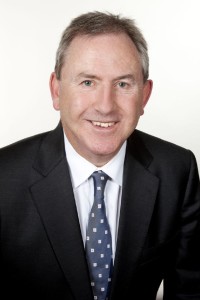After years of relationship building, the BRICS nations –Brazil, Russia, India, China and South Africa – are setting up their own investment bank. It’s a milestone for this strange mix of economies, but may offer Pacific nations access to investment capital, BRICS expert David Thomas tells Business Advantage PNG.

The BRICS leaders. Credit: Reuters
The BRICS concept grew out of research in 2001 by Goldman Sachs economist Jim O’Neill, who analysed the four economies which were most likely to join the US as among the top five global economies in the 21st century.
O’Neill based his research on the key economic drivers of consumption, urbanisation, globalisation and innovation. He identified Brazil, Russia, India and China as the four most likely to succeed. After nearly ten years of talks, the group invited South Africa to join, regarding it as the gateway to Africa.
Land, people, capital
‘I would describe the BRICS grouping as unusually diverse,’ David Thomas, CEO of Think Global Consulting, tells Business Advantage PNG.
‘They don’t naturally come together as a group. There’s no particular reason why these four countries should find themselves as an alliance.
‘In my view, the real reason why the BRICS are so relevant is that they have an abundance of land, people and capital.
‘They have huge land masses and access to resources, commodities and agriculture. They have large populations, each in excess of 100 million people, a GDP that is large and growing, and all will be large economies in the future.’
New development bank
In July 2014, the group agreed to set up its own bank, now called the New Development Bank, with US$50 billion in initial capital, to finance infrastructure and sustainable development projects, similar to the World Bank.
‘…if Pacific nations went as a bloc to the BRICS and said “we want to work with you to invest in projects and opportunities, I think they’d get a very good hearing”.’
As well, a Contingent Reserve Arrangement with US $100 billion in initial capital will provide assistance to emerging economies in financial difficulty, similar to the IMF.

Think Global Consulting’s David Thomas
Economist Jon Hartley says the failure of the IMF to give more voting power to emerging powers, and its failure to elect a non-European IMF director, ‘ultimately’ led to the creation of an alternative lending facility to the IMF.
‘As a result, emerging countries and developing countries—countries that need capital for development—are finding it very difficult to get access to the money they need and I think the BRICS see their role as the champion of developing countries, particularly in Africa, South America and in other places where countries find it difficult to access capital.’
While the BRICS bank will provide an alternative to the World Bank and IMF, it ‘is unlikely to replace the IMF and World Bank in the near future as the latter will still remain powerful players in the global economic order’, says Dingding Chen, Assistant Professor of Government and Public Administration at the University of Macau.
Pacific advantage
Thomas believes the creation of the BRICS bank provides opportunities and lessons for the Pacific.
‘Here’s a good example of four countries that have come together with no real historical ties but who are now starting to do things. The Pacific island nations should take their lead from that and find areas to collaborate and cooperate.
‘I think the BRICS see their role as the champion of developing countries, particularly in Africa, South America and in other places where countries find it difficult to access capital.’
‘Until they set up the bank, the BRICS had just been a talking group, but now they have something tangible they can point their fingers at and say “we now have some control”.’
Pacific nations would be in a similar position if they had access to their own capital and they could find a way of working as a group, Thomas says.
The lesson, says Thomas, is the need for stability.
He also believes that if Pacific nations went as a bloc to the BRICS and said ‘we want to work with you to invest in projects and opportunities, I think they’d get a very good hearing’. But they won’t if they are disparate group and not particularly stable.’
David Thomas is a BRIC expert and CEO of Think Global Consulting and is a Keynote Speaker at the Business Advantage Investment and Infrastructure Summit in Port Moresby, 9 & 10 September
Background to BRICS
Members: Brazil, Russia, India, China, South Africa
HQ: Shanghai
Purpose:
- New Development Bank: to finance development projects
- Contingent Reserve Arrangement: bailout developing nations
Funding:
- New Development Bank: US$50 billion
- US$100 billion
Capital: Split evenly among the five members








Speak Your Mind